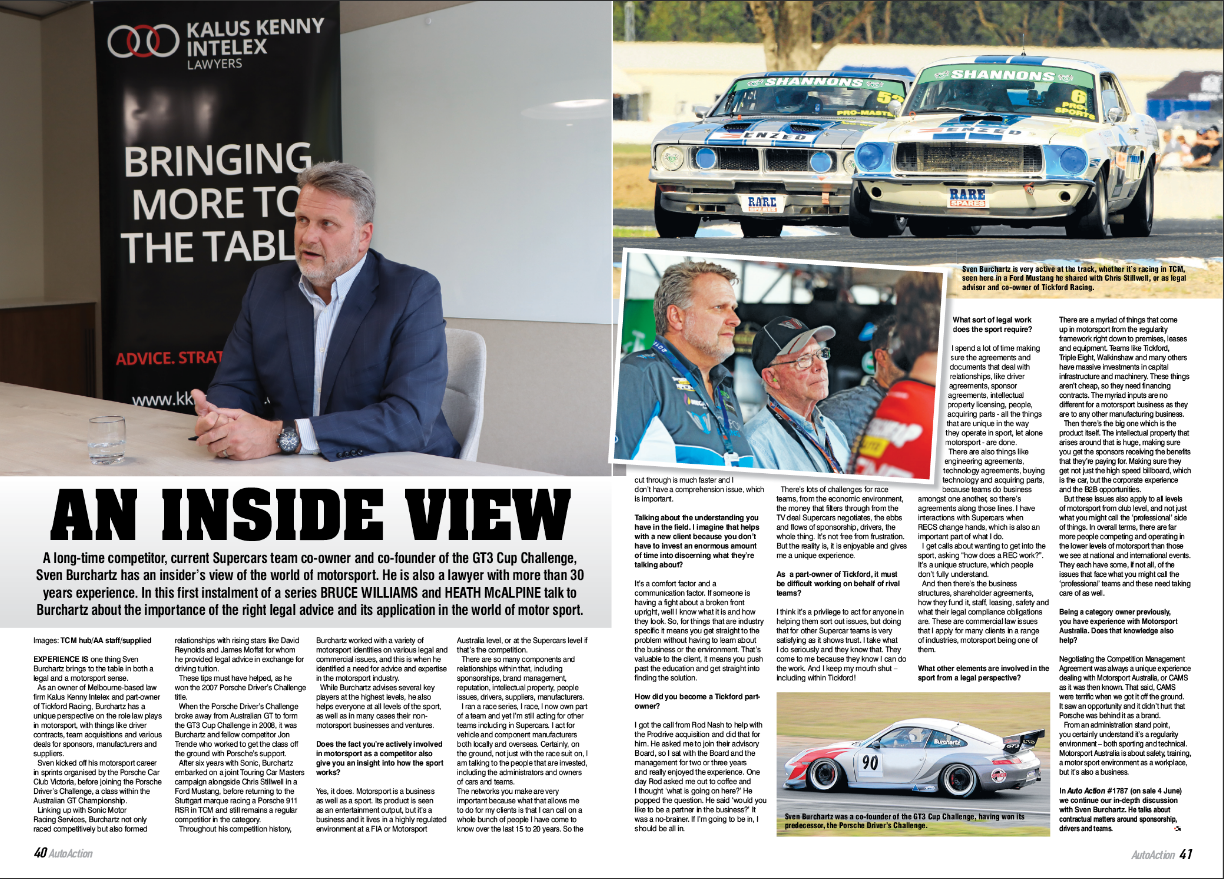In the first of a two-part series, Sven Burchartz was interviewed by Auto Action magazine on his unique involvement in the motor sport industry, his experiences from both on and off the track, as well as the role law plays within the sport.
As featured in Auto Action edition 1785, 7 May 2020, pages 40-41.
Having been a long-time competitor across several categories, a current Supercars team co-owner and the co-founder of GT3 Cup Challenge, Sven Burchartz has an inside view of the world of motor sport. He is also a Lawyer with more than 30 years experience and has been a competitor in both modern and historic Porsche machinery. This gives Sven a unique perspective of the law in terms of its application in motorsport. In the first part of a series, we look at the importance of the right legal advice and apply it to the world of motorsport. In part one, Sven discusses with Bruce Williams and Heath McAlpine some of the important issues.
Experience is one item Sven Burchartz brings to the table both in a legal and a motorsport sense.
As an owner of Melbourne-based law firm Kalus Kenny Intelex and part-owner of Tickford Racing, Burchartz has a unique perspective on the role law plays in motor sport, having been involved in a number of driver contracts, team acquisitions and various deals for sponsors, manufacturers and suppliers.
He kicked off his career in sprints organised by the Porsche Car Club Victoria, before taking the next step in his career and joining the Porsche Driver’s Challenge, a category that was a class within the Australian GT Championship.
Linking up with Sonic Motor Racing Services, this enabled Burchartz to not only race competitively, but form relationships with rising stars David Reynolds and James Moffat. Through this early part of their careers, Burchartz gave legal advice in exchange for driving tips.
These tips must have worked he won the 2007 Porsche Driver’s Challenge title.
When the Porsche Driver’s Challenge broke away from Australian GT to form the GT3 Cup Challenge in 2008, it was Burchartz alongside fellow competitor Jon Trende that worked to get the class off the ground with Porsche’s blessing.
After 6 years with Sonic, Burchartz joined the historic ranks before embarking on a joint-Touring Car Masters campaign alongside Chris Stillwell in his Ford Mustang before returning to the Stuttgart marque racing a Porsche 911 RSR in TCM so he clearly enjoys a challenge.
Through his competitive history, Burchartz has spoken to a variety of motor sport identities about various legal and commercial issues and this is when he grew his portfolio to include motorsport as he identified a need for his advice and expertise within the industry. Whilst he advises many key players at the highest levels, he also helps everyone at all levels as well as in many cases, their other non-motorsport businesses and ventures.
In the first of a two-part series, Burchartz gave Auto Action an overview of what he covers within the motor sport industry, his experiences from both on and off the track as well as what role law plays within the discipline.
Does the fact you’re actively involved in motor sport as a competitor give you unique insight into how the sport works?
Yes it does. Motorsport is a business as well as a sport. Its product is an entertainment output, but it’s a business and it lives in a highly regulated environment at a FIA or Motorsport Australia level, or at the Supercars level if that’s the competition. There are so many components and relationships including sponsorships, brand management, reputation, intellectual property, people issues, drivers, suppliers, manufacturers.
I ran a race series, I race, I now own part of a team and yet I’m still acting for other teams including in Supercars. I act for vehicle and component manufacturers both locally and overseas. Certainly, on the ground, not just with the race suit on, I am talking to the people that are invested, including the administrators and owners of cars and teams.
The networks you make are also very important because what that allows me to do for my clients and anyone involved is, I can call a whole bunch of people I have come to know over the last 15 to 20 years. The cut through is much faster and I don’t have a comprehension issue, which is important.
Talking about the understanding you have in the field, I imagine that helps you with a new client by not investing an enormous amount of time into discerning what they’re talking?
It’s a comfort factor and a communication factor. If someone is having a fight about a broken front upright, well I know what it is and how they look. I’ve paid for plenty! So for the things that are industry specific it means you get straight to the problem without having to learn about the business or the environment. That’s valuable to the client, it means you push past the education piece and get straight into finding the solution.
How did you become a Tickford part owner?
I got the call from Rod Nash to help with the Prodrive acquisition and did that for him. He asked me to join their advisory board so I sat with the board, the management for two or three years and really enjoyed the experience. One day, Rod asked me out to coffee and I thought ‘what was going on here?’ He popped the question. He said ‘would you like to be a partner of the business?’ It was a no-brainer. If I’m going to be in, I should be all in.
There’s lots of challenges for race teams, from the economic environment, the money that filters through from the TV deals Supercars negotiate, the ebbs and flows of sponsorship, drivers, the whole thing, but it’s not free from frustration. The reality is, it is enjoyable and gives me a very unique experience.
As a part owner of Tickford it must be difficult working on behalf of rival teams?
I think it’s a privilege to act for anyone in helping them sort out issues but doing that for other Supercar teams is very satisfying as it shows trust. I take what I do seriously and they know that. They come to me because they know I can do the work. And I keep my mouth shut – including within Tickford!
What kind of legal work does the sport require?
I spend a lot of time making sure the agreements and documents that deal with all these relationships, like driver agreements, sponsor agreements, intellectual property licensing, people, acquiring parts – all the things that are very unique in the way the operate in sport, let alone motor sport – are done.
There are also things like engineering agreements, technology agreements, buying technology and acquiring parts, because teams do business amongst one another so there’s agreements along those lines. I have interactions with Supercars when RECS change hands, which is also an important part of what I do. I get calls about wanting to get into the sport, asking “how does a REC work?”. It’s a unique structure, which people don’t fully understand. And then there’s the business structures, shareholder agreements, how they fund it, staff, leasing, safety and what their legal compliance obligations are. That’s where I have deep knowledge, I add value. Clients come to me because I don’t talk in a language other than the one they understand so that they can get the deal done. These are commercial law issues that I apply for many clients in a range of industries, motorsport being one of them.
What other elements are involved in the sport from a legal perspective?
There are a myriad of things that come up in motor sport from the regularity framework right down to premises, leases and equipment. Teams like Tickford, Triple Eight, Walkinshaw and many others have massive investments in capital infrastructure and machinery. These things aren’t cheap so they need financing contracts. The myriad inputs are no different for a motor sport business as they are to any other manufacturing business.
Then there’s the big one which is the product itself. The intellectual property that arises around that is huge, making sure you get the sponsors receiving the great benefits that they’re paying something for. Making sure they get not just the high speed billboard, which is the car, but the corporate experience and the B2B opportunities.
A sponsor is very happy to see its logo on the side of the car or on the pit wall or the suit of the driver, but often its in it for a whole bunch of other reasons. It could be having customer drive days for example, so we have to have the documents to enter the pits as it is a work place and can be dangerous.
But these issues also apply to all levels of motorsport beginning from club level. And not just what you might call the “professional” side of things. In overall terms there are far more people competing and operating in motorsport than those which we see at national and international events. They each have some if not all of the issues that face what you might call the professional teams and they need taking care of as well.
Being a category owner previously, you have experience with Motorsport Australia. Does that knowledge help?
Negotiating a Competition Management Agreement is always a unique experience dealing with Motorsport Australia, or CAMS as it was then known. That said, CAMS were terrific when we got it off the ground. It saw an opportunity and it didn’t hurt that Porsche was behind it as a brand.
From an administration stand point, you certainly understand its regularity environment – both sporting and technical. Motorsport Australia are about safety, training, the workplace as a motor sport environment, but it’s also a business.
In Auto Action #1787 (on sale 4 June 2020) Sven Burchartz continues the in-depth discussion as he talks about contractual matters around sponsorship, drivers and teams.



